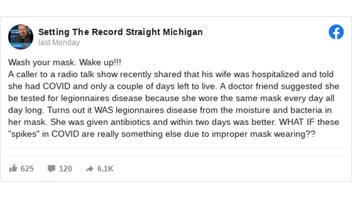
Can wearing dirty face masks cause Legionnaires' disease? No, that's not true: Legionnaires' disease, a type of pneumonia, is caused by bacteria called Legionella. There's no evidence to suggest that a person can contract the disease from a dirty mask.
The claim appeared in a Facebook post (archived here) on July 27, 2020. It read:
Wash your mask. Wake up!!!
A caller to a radio talk show recently shared that his wife was hospitalized and told she had COVID and only a couple of days left to live. A doctor friend suggested she be tested for legionnaires disease because she wore the same mask every day all day long. Turns out it WAS legionnaires disease from the moisture and bacteria in her mask. She was given antibiotics and within two days was better. WHAT IF these "spikes" in COVID are really something else due to improper mask wearing??
This is what the post looked like at the time of writing:
(Source: Facebook screenshot taken on Mon Aug 3 16:11:55 2020 UTC)
Legionnaire's disease is a very serious disease. Although it can be treated with antibiotics, roughly one out of 10 people infected will die. Common symptoms include fever, shortness of breath, muscle aches and headache.
People catch Legionnaires' disease from contaminated engineered water systems that generate aerosols or mists -- not from other people -- according to Michele Swanson, a professor of microbiology and immunology at the University of Michigan and longtime Legionella researcher. She had this to say about the possibility of Legionnaires' disease being caused by masks:
There is no evidence that a person can contract Legionnaires' disease from a dirty, moist mask. Nor is that scenario plausible: Legionella has stringent growth requirements -- iron and amino acids, for example -- that would not be provided by exhaled breath or inhaled air. So the concentration of Legionella that a person could inhale from contaminated water droplets from an engineered water system, such as a spa, decorative water feature, or a cooling tower, would be reduced by their mask, rather than increased.
Although there is no evidence tying masks to Legionnaires' disease, there is a connection between the disease and COVID-19. Specifically, coronavirus forced countless buildings to close or drastically lower their occupancies. That, in turn, meant reductions in water use. As stagnant or standing water in plumbing systems can increase the risk for Legionella, health officials are urging the proper steps be taken when those buildings reopen.
Again, here's Swanson:
There is a large scientific literature that shows that when water flow or usage in buildings has been reduced (for example, a wing of a hotel or hospital that was taken offline during a period of low census), the stagnant water promotes growth of Legionella to higher levels. When the water system is put back online, a large bolus of Legionella can be dislodged from the interior surface of the pipes, increasing risk of Legionnaires' disease. During the COVID-19 pandemic, there have been a number of public health advisories to building managers to be sure their water systems are properly flushed and treated if necessary before occupancy resumes.
In May, the Centers for Disease Control and Prevention (CDC) issued updated guidance for reopening buildings. It outlined eight steps to minimize Legionella risk, including developing a comprehensive water management program, cleaning decorative water features, flushing water systems and ensuring that all cooling towers and safety equipment, such as sprinklers, are clean and well-maintained.
On the issue of masks, the CDC recommends that people wear them in public settings to help slow the spread of COVID-19. To be clear, it also recommends that reusable masks are washed after each use.


















